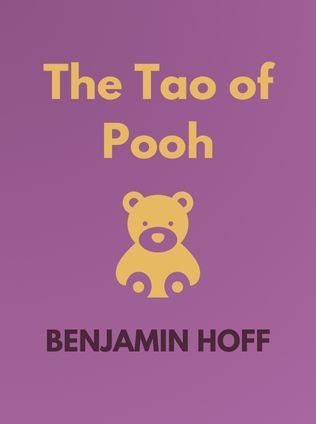
The Tao of Pooh
By Benjamin Hoff
Published 04/1982
About the Author
Benjamin Hoff, an American author and philosopher, is best known for his insightful books that intertwine Eastern philosophy with Western culture. His most renowned work, The Tao of Pooh, was published in 1982 and has since become a beloved classic. Hoff’s ability to distill complex Taoist teachings into the simple, endearing language of Winnie the Pooh characters has captivated readers across generations. Through his work, Hoff not only introduced Taoism to a wider audience but also demonstrated the timeless relevance of its principles in modern life. His work reflects a deep understanding of both Eastern and Western thought, making his books a bridge between these two worlds.
Main Idea
The Tao of Pooh is a unique and enlightening exploration of Taoism, an ancient Chinese philosophy that emphasizes living in harmony with the Tao, or the natural way of the universe. Hoff uses the characters from A.A. Milne’s Winnie the Pooh to illustrate Taoist principles, showing how these seemingly simple stories carry profound wisdom. The main idea of the book is to demonstrate that the key to happiness and contentment lies not in striving or accumulating knowledge, but in embracing simplicity, humility, and the natural flow of life. Through the character of Pooh, who embodies the essence of Taoism, Hoff reveals that true wisdom comes from living authentically and in tune with the world around us.
Table of Contents
- The Tao of Pooh
- The Uncarved Block
- The Cottleston Pie Principle
- The Way of Pooh
- The Antithesis of Wu Wei
- The Tiddely Pom Principle
- The Empty Mind
- Taoism and Modern Society
The Tao of Pooh
At the heart of The Tao of Pooh lies the character of Pooh, who, despite his simplicity—or perhaps because of it—lives in a state of effortless harmony with the world. Pooh’s ability to navigate life without unnecessary complication or stress is a direct reflection of the Taoist principle of living in accordance with the Tao. In Taoism, the Tao is the ultimate principle that underlies the universe, guiding all things in a natural, effortless flow.
“The Tao of Pooh is about how to stay in harmony with the basic principles of Taoism by living simply and being true to one's own nature.” — Benjamin Hoff
Pooh’s approach to life is a perfect embodiment of this principle. He doesn’t overthink, he doesn’t rush, and he doesn’t strive for more than what he needs. Instead, he takes each day as it comes, finding joy in the simple things—whether it’s a pot of honey, a walk in the woods, or the company of friends. Through Pooh, Hoff illustrates that the key to contentment is not in doing more, but in being more—being more present, more aware, and more in tune with the world around us.
The Uncarved Block
The concept of the Uncarved Block (P’u) is central to Taoist philosophy, and it is one of the key ideas explored in The Tao of Pooh. The Uncarved Block represents things in their original, natural state, untouched by human manipulation or interference. According to Taoism, things in their natural state possess their own inherent power and beauty, which is lost when they are altered or “carved.”
“The essence of the Uncarved Block is that things in their natural, original state carry their own power and simplicity. Pooh, in his unassuming and uncomplicated way, embodies this principle perfectly.” — Benjamin Hoff
In the context of the book, Pooh is the living embodiment of the Uncarved Block. He is simple, unpretentious, and free from the intellectual and emotional baggage that complicates life for others. While characters like Owl and Rabbit are caught up in their own cleverness and overthinking, Pooh simply is. He moves through life without the need to force things or manipulate outcomes, and as a result, he often finds himself at the center of events, not because he tries, but because he allows life to unfold naturally.
Sign up for FREE and get access to 1,400+ books summaries.
You May Also Like
The Subtle Art of Not Giving a F*ck
A Counterintuitive Approach to Living a Good Life
By Mark MansonRich Dad Poor Dad
What the Rich Teach Their Kids About Money - That the Poor and Middle Class Do Not!
By Robert T. KiyosakiHow To Win Friends and Influence People
The All-Time Classic Manual Of People Skills
By Dale Carnegie



















